Charles E W Bean, Diaries, AWM38 3DRL 606/237/1 - October 1914 - 1918 - Part 7
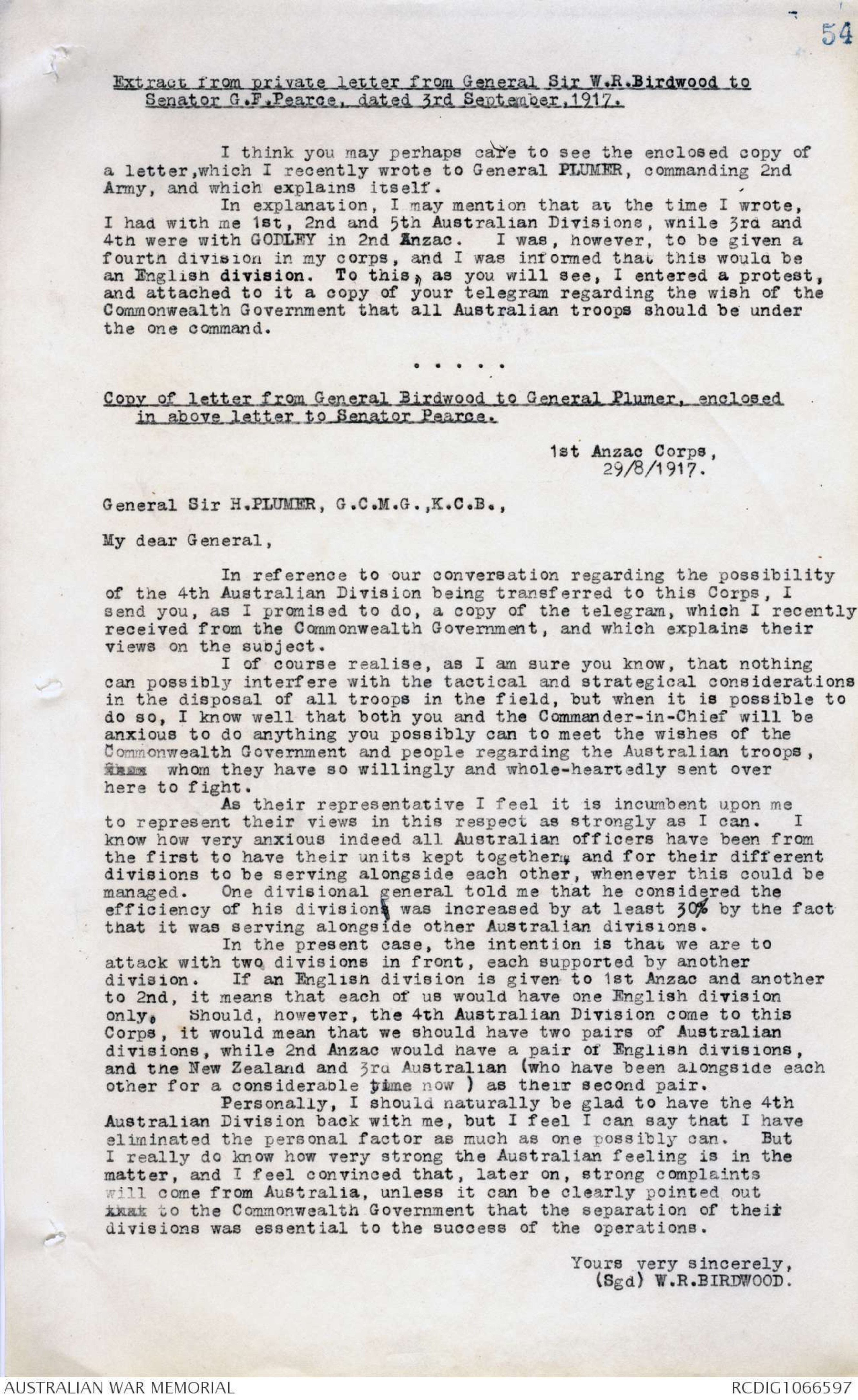
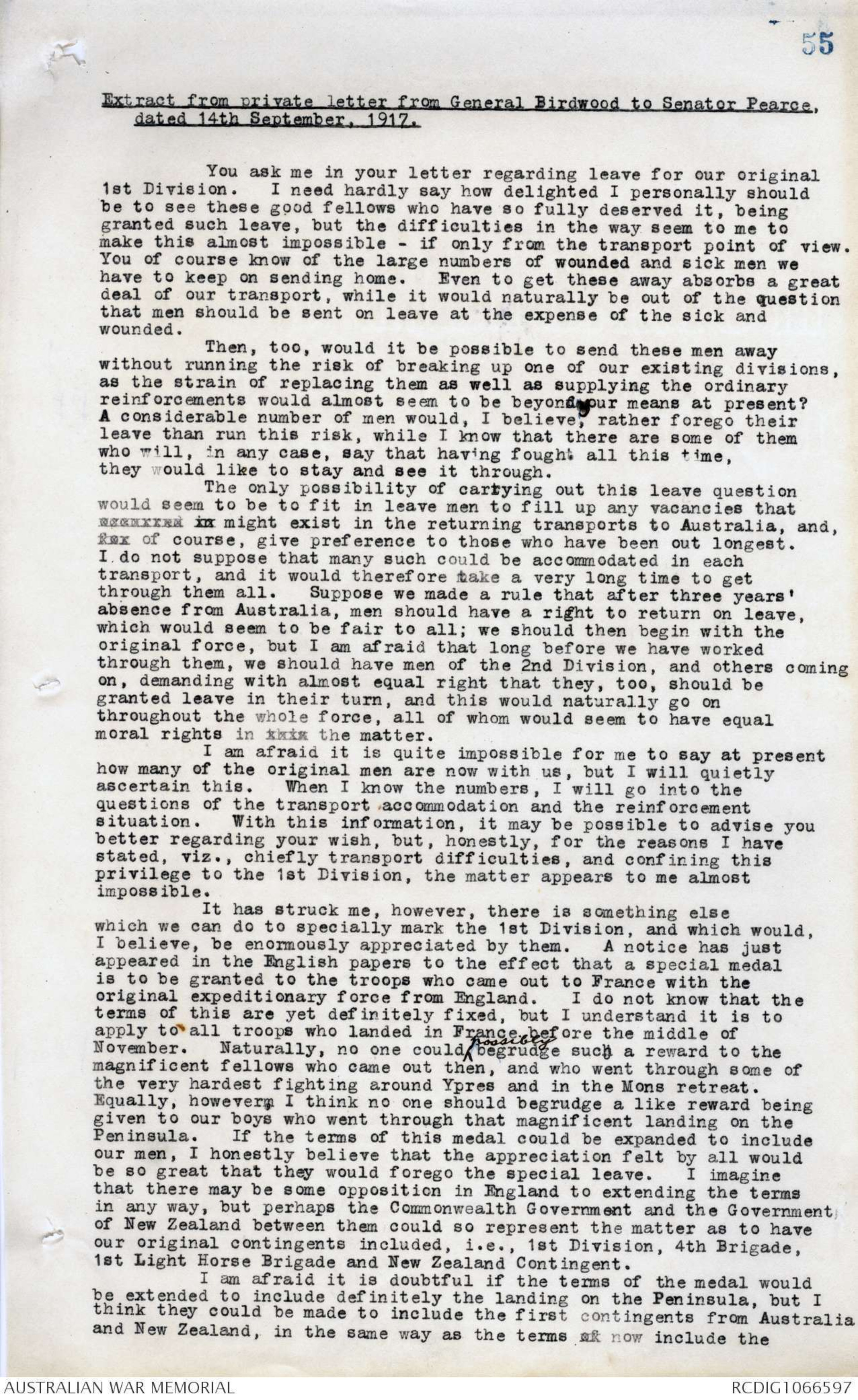
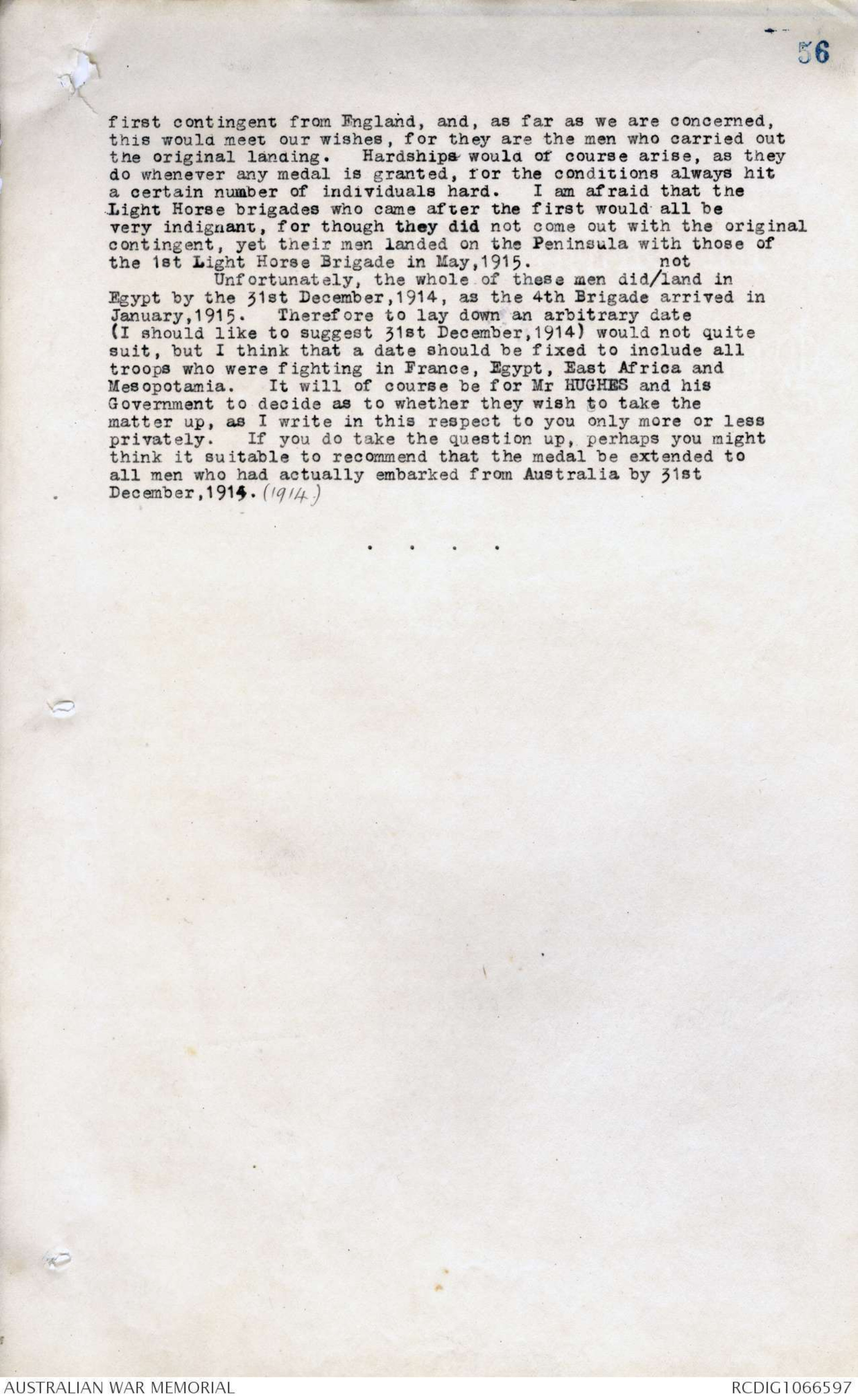
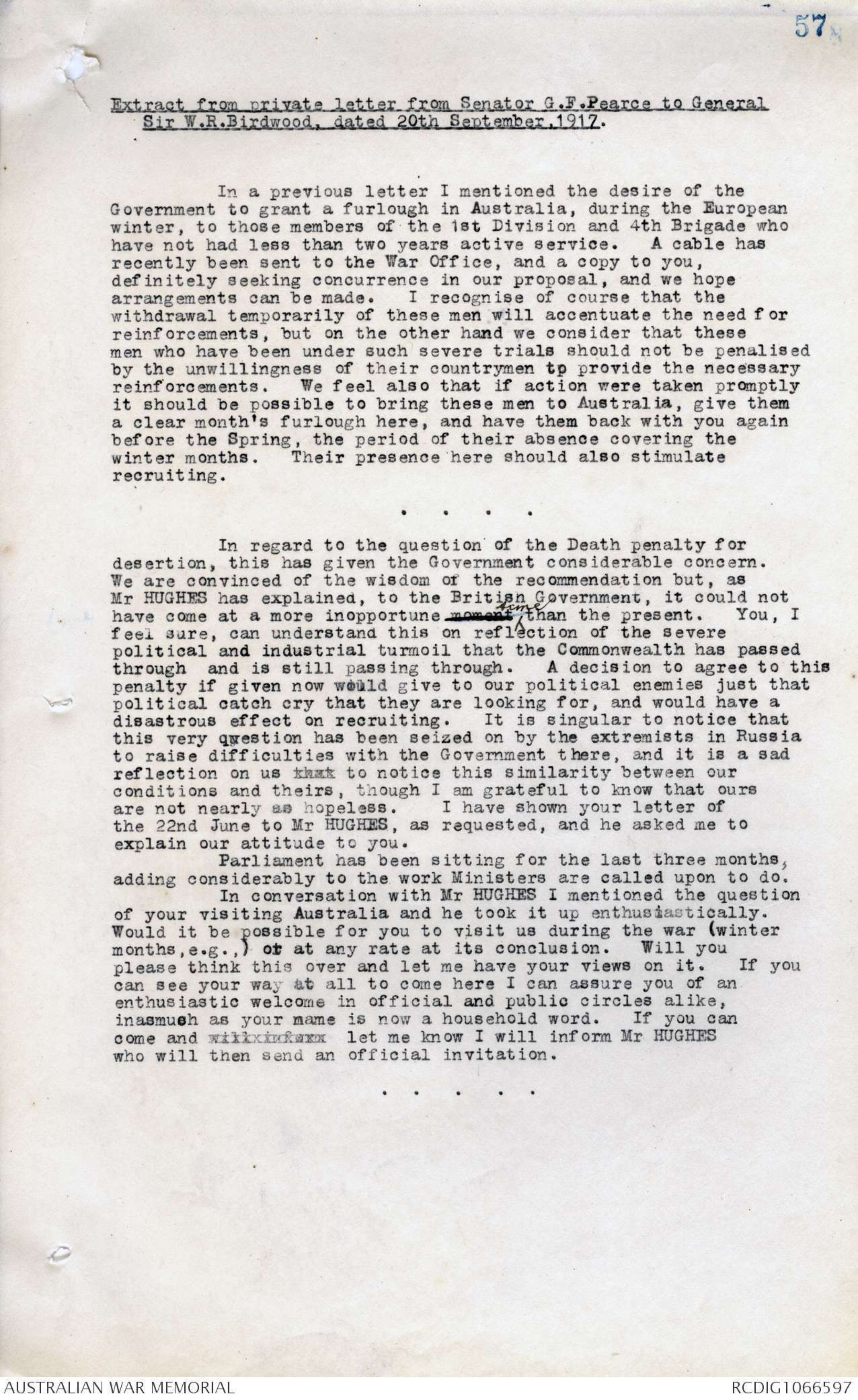
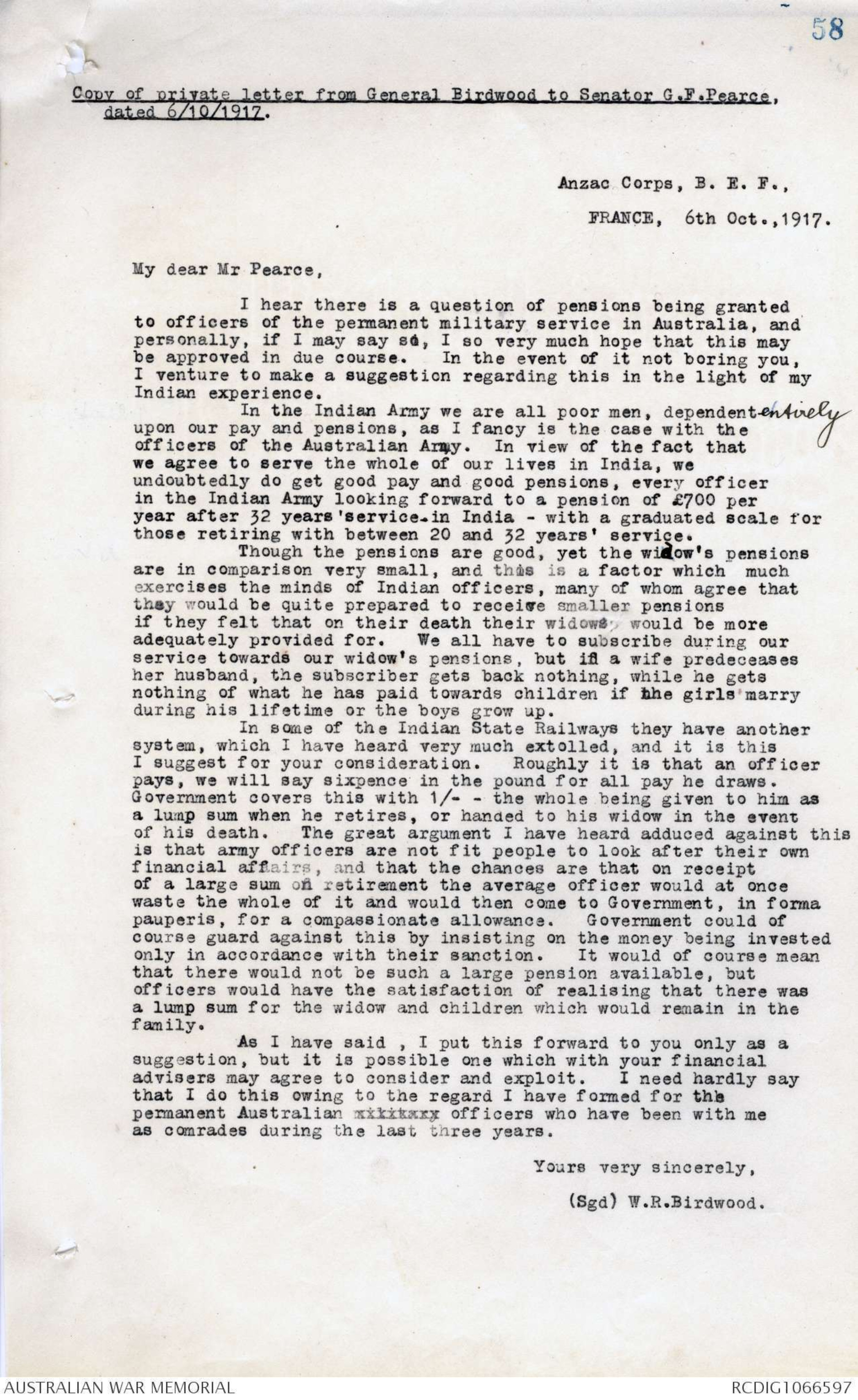
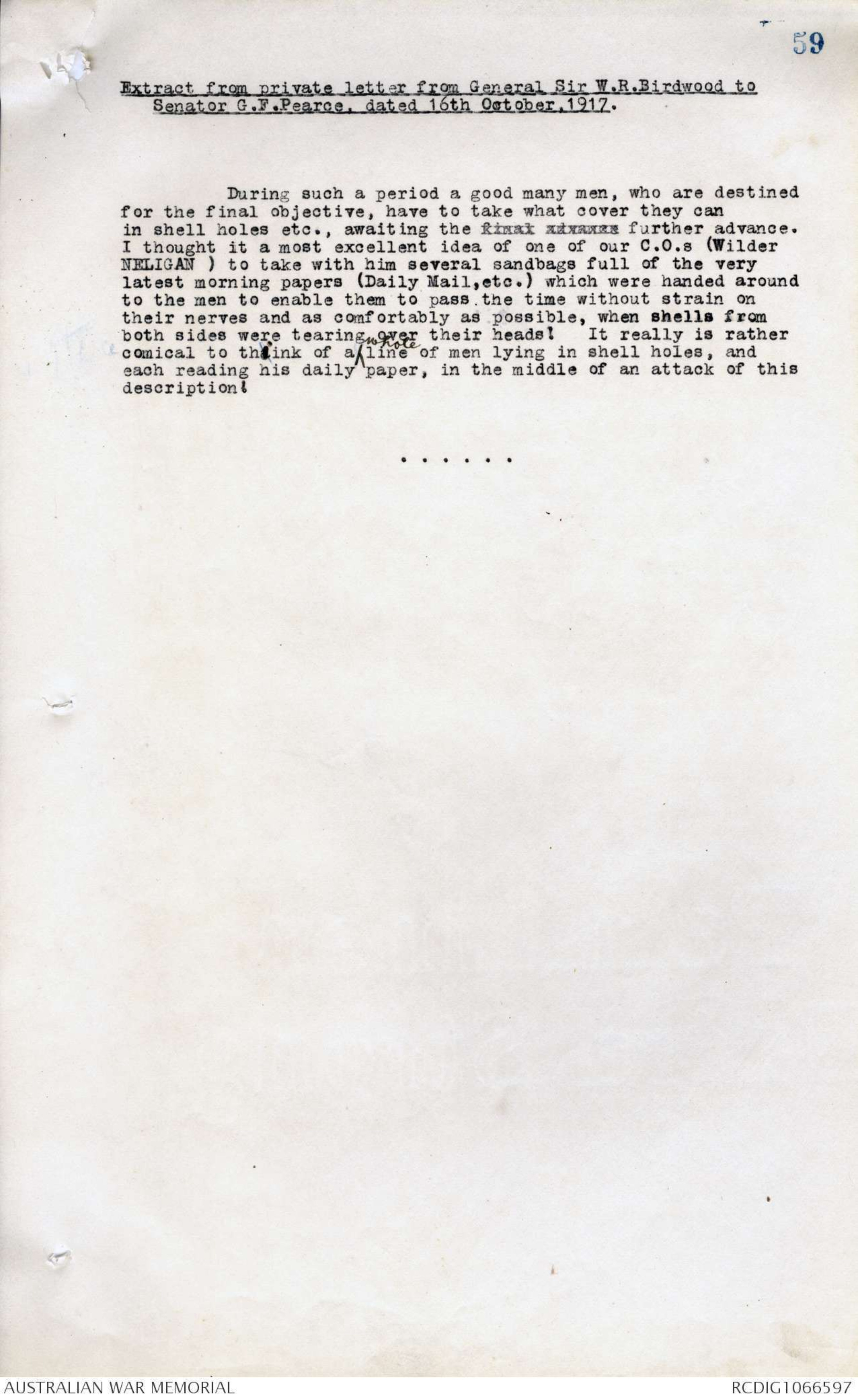
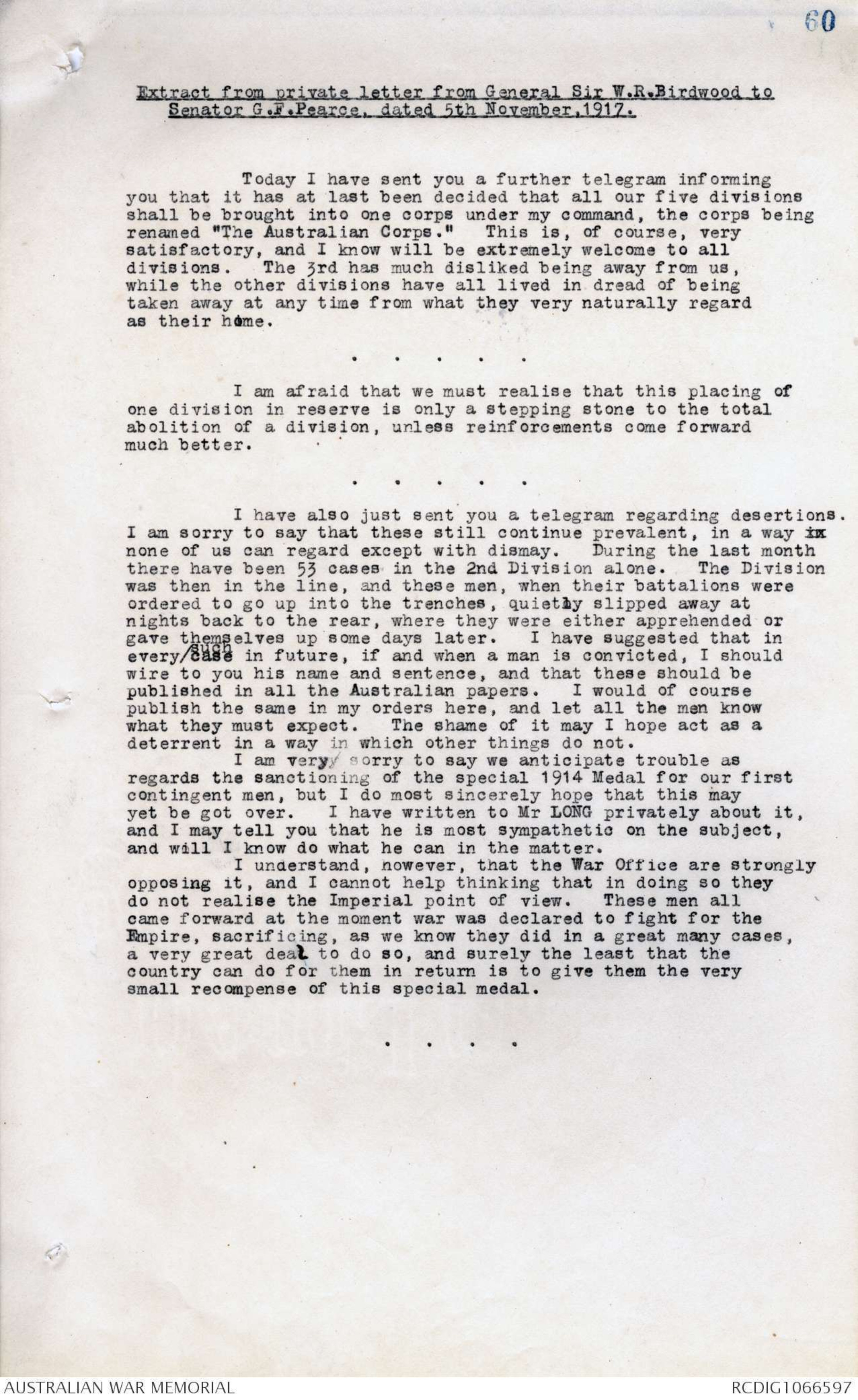
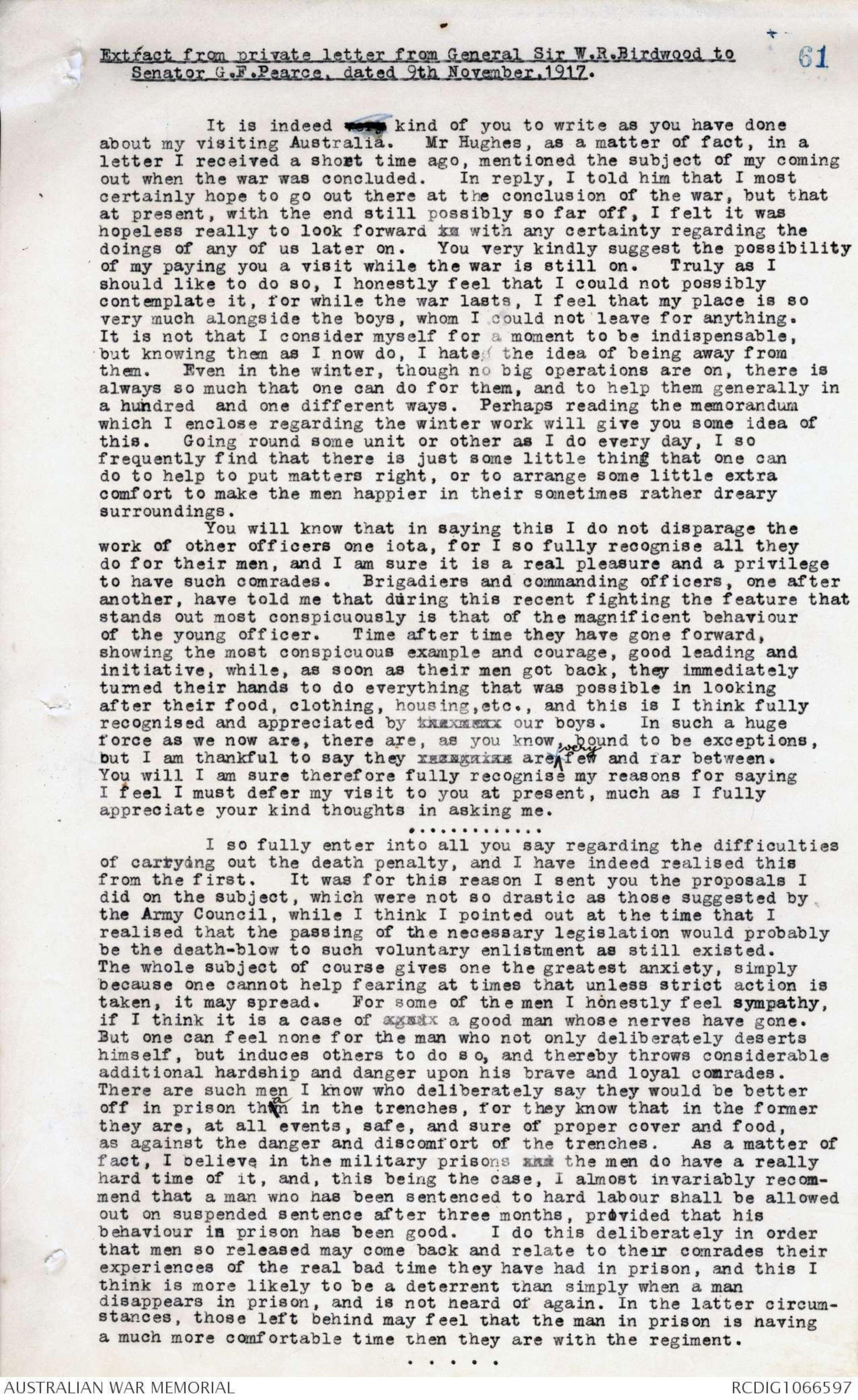
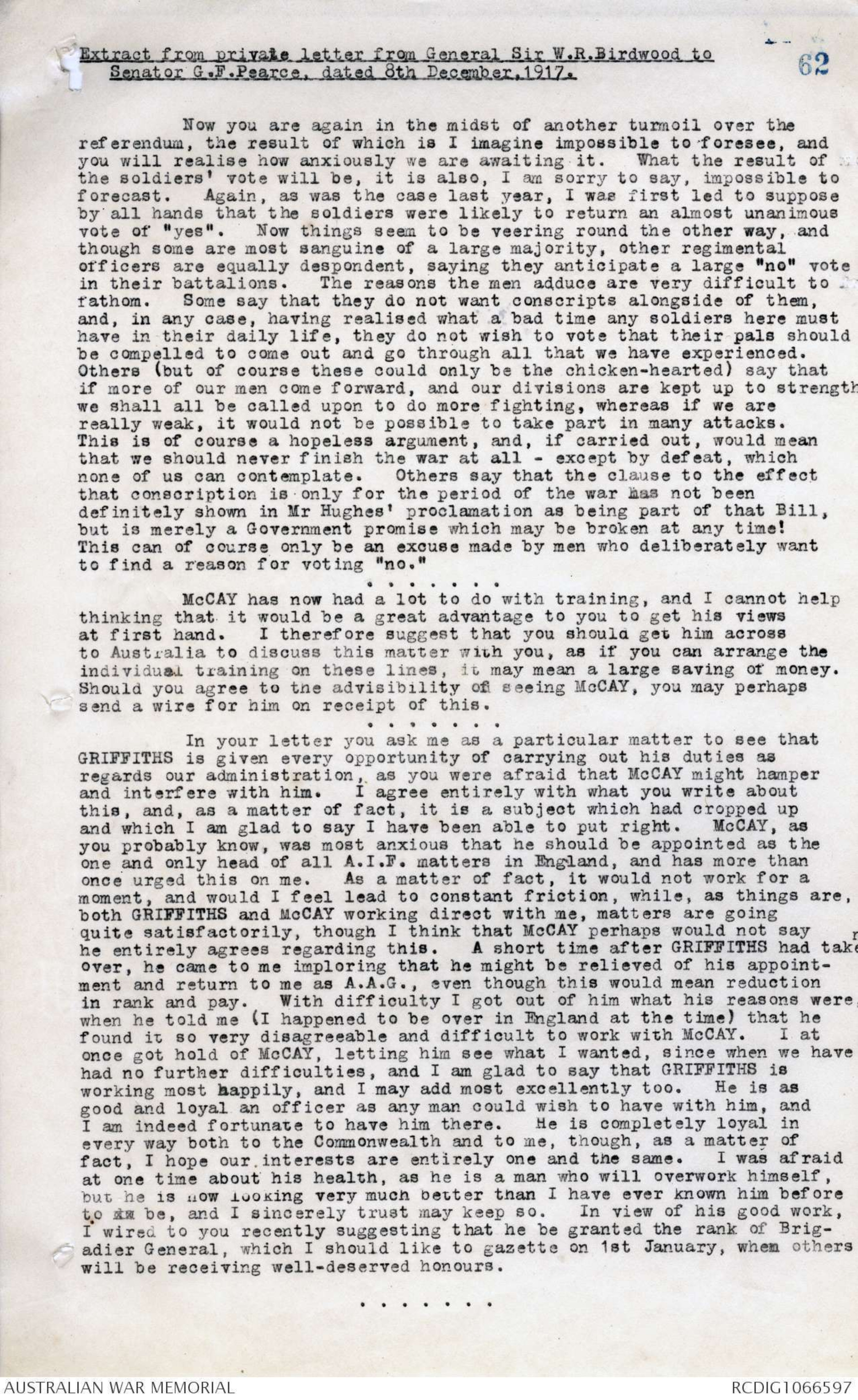
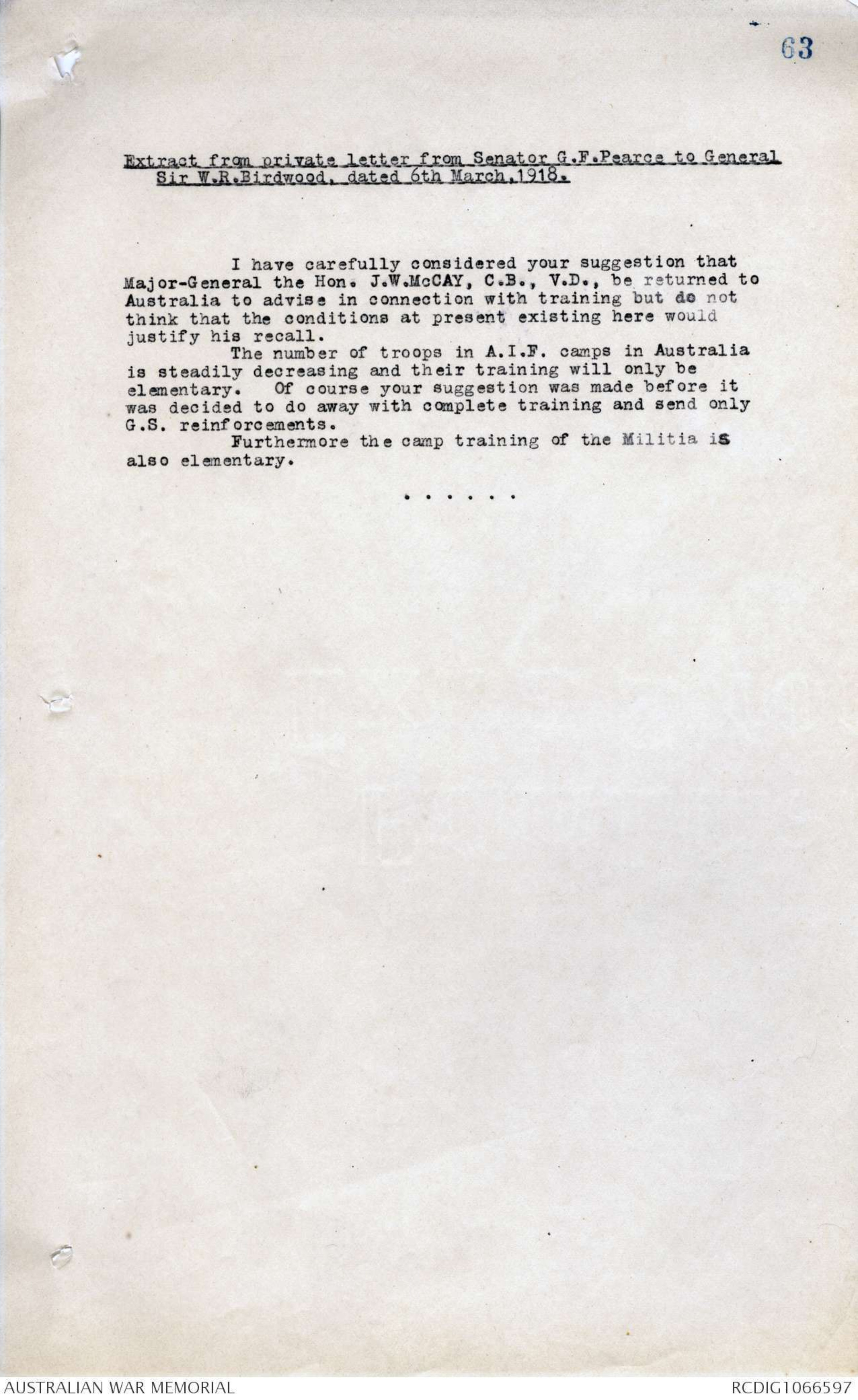
54
Extract from private letter from General Sir W.R.Birdwood to
Senator G.F.Pearce, dated 3rd September,1917.
I think you may perhaps care to see the enclosed copy of
a letter, which I recently wrote to General PLUMER, commanding 2nd
Army, and which explains itself.
In explanation, I may mention that at the time I wrote,
I had with me 1st, 2nd and 5th Australian Divisions, while 3rd and
4th were with GODLEY in 2nd Anzac. I was, however, to be given a
fourth division in my corps, and I was informed that this would be
an English division. To this, as you will see, I entered a protest,
and attached to it a copy of your telegram regarding the wish of the
Commonwealth Government that all Australian troops should be under
the one command.
Copy of letter from General Birdwood to General Plumer, enclosed
in above letter to Senator Pearce.
1st Anzac Corps,
29/8/1917.
General Sir H. PLUMER, G.C.M.G.,K.C.B.,
My dear General,
In reference to our conversation regarding the possibility
of the 4th Australian Division being transferred to this Corps, I
send you, as I promised to do, a copy of the telegram, which I recently
received from the Commonwealth Government, and which explains their
views on the subject.
I of course realise, as I am sure you know, that nothing
can possibly interfere with the tactical and strategical considerations
in the disposal of all troops in the field, but when it is possible to
do so, I know well that both you and the Commander-in-Chief will be
anxious to do anything you possibly can to meet the wishes of the
Commonwealth Government and people regarding the Australian troops,xxxx whom they have so willingly and whole-heartedly sent over
here to fight.
As their representative I feel it is incumbent upon me
to represent their views in this respect as strongly as I can. I
know how very anxious indeed all Australian officers have been from
the first to have their units kept together, and for their different
divisions to be serving alongside each other, whenever this could be
managed. One divisional general told me that he considered the
efficiency of his divisions was increased by at least 30% by the fact
that it was serving alongside other Australian divisions.
In the present case, the intention is that we are to
attack with two divisions in front, each supported by another
division. If an English division is given to 1st Anzac and another
to 2nd, it means that each of us would have one English division
only. Should, however, the 4th Australian Division come to this
Corps, it would mean that we should have two pairs of Australian
divisions, while 2nd Anzac would have a pair of English divisions,
and the New Zealand and 3rd Australian (who have been alongside each
other for a considerable time now) as their second pair.
Personally, I should naturally be glad to have the 4th
Australian Division back with me, but I feel I can say that I have
eliminated the personal factor as much as one possibly can. But
I really do know how very strong the Australian feeling is in the
matter, and I feel convinced that, later on, strong complaints
will come from Australia, unless it can be clearly pointed outthat to the Commonwealth Government that the separation of their
divisions was essential to the success of the operations.
Yours very sincerely,
(Sgd) W.R.BIRDWOOD.
55
Extract from private letter from General Birdwood to Senator Pearce,
dated 14th September, 1917.
You ask me in your letter regarding leave for our original
1st Division. I need hardly say how delighted I personally should
be to see these good fellows who have so fully deserved it, being
granted such leave, but the difficulties in the way seem to me to
make this almost impossible - if only from the transport point of view.
You of course know of the large numbers of wounded and sick men we
have to keep on sending home. Even to get these away absorbs a great
deal of our transport, while it would naturally be out of the question
that men should be sent on leave at the expense of the sick and
wounded.
Then, too, would it be possible to send these men away
without running the risk of breaking up one of our existing divisions,
as the strain of replacing them as well as supplying the ordinary
reinforcements would almost seem to be beyond your means at present?
A considerable number of men would, I believe, rather forego their
leave than run this risk, while I know that there are some of them
who will, in any case, say that having fought all this time,
they would like to stay and see it through.
The only possibility of carrying out this leave question
would seem to be to fit in leave men to fill up any vacancies thatxxxxxxxx in might exist in the returning transports to Australia, and,for of course, give preference to those who have been out longest.
I do not suppose that many such could be accommodated in each
transport, and it would therefore take a very long time to get
through them all. Suppose we made a rule that after three years'
absence from Australia, men should have a right to return on leave,
which would seem to be fair to all; we should then begin with the
original force, but I am afraid that long before we have worked
through them, we should have men of the 2nd Division, and others coming
on, demanding with almost equal right that they, too, should be
granted leave in their turn, and this would naturally go on
throughout the whole force, all of whom would seem to have equal
moral rights in this the matter.
I am afraid it is quite impossible for me to say at present
how many of the original men are now with us, but I will quietly
ascertain this. When I know the numbers, I will go into the
questions of the transport accommodation and the reinforcement
situation. With this information, it may be possible to advise you
better regarding your wish, but, honestly, for the reasons I have
stated, viz., chiefly transport difficulties, and confining this
privilege to the 1st Division, the matter appears to me almost
impossible.
It has struck me, however, there is something else
which we can do to specially mark the 1st Division, and which would,
I believe, be enormously appreciated by them. A notice has just
appeared in the English papers to the effect that a special medal
is to be granted to the troops who came out to France with the
original expeditionary force from England. I do not know that the
terms of this are yet definitely fixed, but I understand it is to
apply to all troops who landed in France before the middle of
November. Naturally, no one could ^possibly begrudge such a reward to the
magnificent fellows who came out then, and who went through some of
the very hardest fighting around Ypres and in the Mons retreat.
Equally, however, I think no one should begrudge a like reward being
given to our boys who went through that magnificent landing on the
Peninsula. If the terms of this medal could be expanded to include
our men, I honestly believe that the appreciation felt by all would
be so great that they would forego the special leave. I imagine
that there may be some opposition in England to extending the terms
in any way, but perhaps the Commonwealth Government and the Government
of New Zealand between them could so represent the matter as to have
our original contingents included, i.e., 1st Division, 4th Brigade,
1st Light Horse Brigade and New Zealand Contingent.
I am afraid it is doubtful if the terms of the medal would
be extended to include definitely the landing on the Peninsula, but I
think they could be made to include the first contingents from Australia
and New Zealand, in the same way as the terms of now include the
56
first contingent from England, and, as far as we are concerned,
this would meet our wishes, for they are the men who carried out
the original landing. Hardships would of course arise, as they
do whenever any medal is granted, for the conditions always hit
a certain number of individuals hard. I am afraid that the
Light Horse brigades who came after the first would all be
very indignant, for though they did not come out with the original
contingent, yet their men landed on the Peninsula with those of
the 1st Light Horse Brigade in May, 1915.
Unfortunately, the whole of these men did ^not land in
Egypt by the 31st December, 1914, as the 4th Brigade arrived in
January, 1915. Therefore to lay down an arbitrary date
(I should like to suggest 31st December, 1914) would not quite
suit, but I think that a date should be fixed to include all
troops who were fighting in France, Egypt, East Africa and
Mesopotamia. It will of course be for Mr HUGHES and his
Government to decide as to whether they wish to take the
matter up, as I write in this respect to you only more or less
privately. If you do take the question up, perhaps you might
think it suitable to recommend that the medal be extended to
all men who had actually embarked from Australia by 31st
December,1914. (1914.)
57
Extract from private letter from Senator G.F.Pearce to General
Sir W.R.Birdwood, dated 20th September 1917.
In a previous letter I mentioned the desire of the
Government to grant a furlough in Australia, during the European
winter, to those members of the 1st Division and 4th Brigade who
have not had less than two years active service. A cable has
recently been sent to the War Office, and a copy to you,
definitely seeking concurrence in our proposal, and we hope
arrangements can be made. I recognise of course that the
withdrawal temporarily of these men will accentuate the need for
reinforcements, but on the other hand we consider that these
men who have been under such severe trials should not be penalised
by the unwillingness of their countrymen to provide the necessary
reinforcements. We feel also that if action were taken promptly
it should be possible to bring these men to Australia, give them
a clear month's furlough here, and have them back with you again
before the Spring, the period of their absence covering the
winter months. Their presence here should also stimulate
recruiting.
In regard to the question of the Death penalty for
desertion, this has given the Government considerable concern.
We are convinced of the wisdom of the recommendation but, as
Mr HUGHES has explained, to the British Government, it could not
have come at a more inopportune moment ^ time than the present. You, I
feel sure, can understand this on reflection of the severe
political and industrial turmoil that the Commonwealth has passed
through and is still passing through. A decision to agree to this
penalty if given now would give to our political enemies just that
political catch cry that they are looking for, and would have a
disastrous effect on recruiting. It is singular to notice that
this very question has been seized on by the extremists in Russia
to raise difficulties with the Government there, and it is a sad
reflection on us that to notice this similarity between our
conditions and theirs, though I am grateful to know that ours
are not nearly as hopeless. I have shown your letter of
the 22nd June to Mr HUGHES, as requested, and he asked me to
explain our attitude to you.
Parliament has been sitting for the last three months,
adding considerably to the work Ministers are called upon to do.
In conversation with Mr HUGHES I mentioned the question
of your visiting Australia and he took it up enthusiastically.
Would it be possible for you to visit us during the war (winter
months, e.g.,) or at any rate at its conclusion. Will you
please think this over and let me have your views on it. If you
can see your way at all to come here I can assure you of an
enthusiastic welcome in official and public circles alike,
inasmuch as your name is now a household word. If you can
come and will inform let me know I will inform Mr HUGHES
who will then send an official invitation.
58
Copy of private letter from General Birdwood to Senator G.F.Pearce,
dated 6/10/1917.
Anzac Corps, B. E. F.,
FRANCE, 6th Oct.,1917.
My dear Mr Pearce,
I hear there is a question of pensions being granted
to officers of the permanent military service in Australia, and
personally, if I may say so, I so very much hope that this may
be approved in due course. In the event of it not boring you,
I venture to make a suggestion regarding this in the light of my
Indian experience.
In the Indian Army we are all poor men, dependent entirely
upon our pay and pensions, as I fancy is the case with the
officers of the Australian Army. In view of the fact that
we agree to serve the whole of our lives in India, we
undoubtedly do get good pay and good pensions, every officer
in the Indian Army looking forward to a pension of £700 per
year after 32 years' service.in India - with a graduated scale for
those retiring with between 20 and 32 years' service.
Though the pensions are good, yet the widow's pensions
are in comparison very small, and this is a factor which much
exercises the minds of Indian officers, many of whom agree that
they would be quite prepared to receive smaller pensions
if they felt that on their death their widows would be more
adequately provided for. We all have to subscribe during our
service towards our widow's pensions, but if a wife predeceases
her husband, the subscriber gets back nothing, while he gets
nothing of what he has paid towards children if the girls' marry
during his lifetime or the boys grow up.
In some of the Indian State Railways they have another
system, which I have heard very much extolled, and it is this
I suggest for your consideration. Roughly it is that an officer
pays, we will say sixpence in the pound for all pay he draws.
Government covers this with 1/- - the whole being given to him as
a lump sum when he retires, or handed to his widow in the event
of his death. The great argument I have heard adduced against this
is that army officers are not fit people to look after their own
financial affairs, and that the chances are that on receipt
of a large sum on retirement the average officer would at once
waste the whole of it and would then come to Government, in forma
pauperis, for a compassionate allowance. Government could of
course guard against this by insisting on the money being invested
only in accordance with their sanction. It would of course mean
that there would not be such a large pension available, but
officers would have the satisfaction of realising that there was
a lump sum for the widow and children which would remain in the
family.
As I have said, I put this forward to you only as a
suggestion, but it is possible one which with your financial
advisers may agree to consider and exploit. I need hardly say
that I do this owing to the regard I have formed for the
permanent Australian military officers who have been with me
as comrades during the last three years.
Yours very sincerely,
(Sgd) W.R.Birdwood.
59
Extract from private letter from General Sir W.R.Birdwood to
Senator G.F.Pearce, dated 16th October. 1917.
During such a period a good many men, who are destined
for the final objective, have to take what cover they can
in shell holes etc., awaiting the final advance further advance.
I thought it a most excellent idea of one of our C.O.s (Wilder
NELIGAN) to take with him several sandbags full of the very
latest morning papers (Daily Mail,etc.) which were handed around
to the men to enable them to pass the time without strain on
their nerves and as comfortably as possible, when shells from
both sides were tearing over their heads! It really is rather
comical to thiink of a ^whole line of men lying in shell holes, and
each reading his daily paper, in the middle of an attack of this
description!
60
Extract from private letter from General Sir W.R.Birdwood to
Senator G.F.Pearce, dated 5th November,1917.
Today I have sent you a further telegram informing
you that it has at last been decided that all our five divisions
shall be brought into one corps under my command, the corps being
renamed "The Australian Corps." This is, of course, very
satisfactory, and I know will be extremely welcome to all
divisions. The 3rd has much disliked being away from us,
while the other divisions have all lived in dread of being
taken away at any time from what they very naturally regard
as their home.
I am afraid that we must realise that this placing of
one division in reserve is only a stepping stone to the total
abolition of a division, unless reinforcements come forward
much better.
I have also just sent you a telegram regarding desertions.
I am sorry to say that these still continue prevalent, in a way in
none of us can regard except with dismay. During the last month
there have been 53 cases in the 2nd Division alone. The Division
was then in the line, and these men, when their battalions were
ordered to go up into the trenches, quietly slipped away at
nights back to the rear, where they were either apprehended or
gave themselves up some days later. I have suggested that in
every ^such case in future, if and when a man is convicted, I should
wire to you his name and sentence, and that these should be
published in all the Australian papers. I would of course
publish the same in my orders here, and let all the men know
what they must expect. The shame of it may I hope act as a
deterrent in a way in which other things do not.
I am veryy sorry to say we anticipate trouble as
regards the sanctioning of the special 1914 Medal for our first
contingent men, but I do most sincerely hope that this may
yet be got over. I have written to Mr LONG privately about it,
and I may tell you that he is most sympathetic on the subject,
and will I know do what he can in the matter.
I understand, however, that the War Office are strongly
opposing it, and I cannot help thinking that in doing so they
do not realise the Imperial point of view. These men all
came forward at the moment war was declared to fight for the
Empire, sacrificing, as we know they did in a great many cases,
a very great deal to do so, and surely the least that the
country can do for them in return is to give them the very
small recompense of this special medal.
61
Extract from private letter from General Sir W.R.Birdwood to
Senator G.F.Pearce, dated 9th November,1917.
It is indeed very kind of you to write as you have done
about my visiting Australia. Mr Hughes, as a matter of fact, in a
letter I received a short time ago, mentioned the subject of my coming
out when the war was concluded. In reply, I told him that I most
certainly hope to go out there at the conclusion of the war, but that
at present, with the end still possibly so far off, I felt it was
hopeless really to look forward with any certainty regarding the
doings of any of us later on. You very kindly suggest the possibility
of my paying you a visit while the war is still on. Truly as I
should like to do so, I honestly feel that I could not possibly
contemplate it, for while the war lasts, I feel that my place is so
very much alongside the boys, whom I could not leave for anything.
It is not that I consider myself for a moment to be indispensable,
but knowing them as I now do, I hate the idea of being away from
them. Even in the winter, though no big operations are on, there is
always so much that one can do for them, and to help them generally in
a hundred and one different ways. Perhaps reading the memorandum
which I enclose regarding the winter work will give you some idea of
this. Going round some unit or other as I do every day, I so
frequently find that there is just some little thing that one can
do to help to put matters right, or to arrange some little extra
comfort to make the men happier in their sometimes rather dreary
surroundings.
You will know that in saying this I do not disparage the
work of other officers one iota, for I so fully recognise all they
do for their men, and I am sure it is a real pleasure and a privilege
to have such comrades. Brigadiers and commanding officers, one after
another, have told me that during this recent fighting the feature that
stands out most conspicuously is that of the magnificent behaviour
of the young officer. Time after time they have gone forward,
showing the most conspicuous example and courage, good leading and
initiative, while, as soon as their men got back, they immediately
turned their hands to do everything that was possible in looking
after their food, clothing, housing, etc., and this is I think fully
recognised and appreciated by the men our boys. In such a huge
force as we now are, there are, as you know, bound to be exceptions,
but I am thankful to say they recognise are ^very few and far between.
You will I am sure therefore fully recognise my reasons for saying
I feel I must defer my visit to you at present, much as I fully
appreciate your kind thoughts in asking me.
I so fully enter into all you say regarding the difficulties
of carrying out the death penalty, and I have indeed realised this
from the first. It was for this reason I sent you the proposals I
did on the subject, which were not so drastic as those suggested by
the Army Council, while I think I pointed out at the time that I
realised that the passing of the necessary legislation would probably
be the death-blow to such voluntary enlistment as still existed.
The whole subject of course gives one the greatest anxiety, simply
because one cannot help fearing at times that unless strict action is
taken, it may spread. For some of the men I honestly feel sympathy,
if I think it is a case of xxxxx a good man whose nerves have gone.
But one can feel none for the man who not only deliberately deserts
himself, but induces others to do so, and thereby throws considerable
additional hardship and danger upon his brave and loyal comrades.
There are such men I know who deliberately say they would be better
off in prison thean in the trenches, for they know that in the former
they are, at all events, safe, and sure of proper cover and food,
as against the danger and discomfort of the trenches. As a matter of
fact, I believe in the military prisons xxx the men do have a really
hard time of it, and, this being the case, I almost invariably recommend
that a man who has been sentenced to hard labour shall be allowed
out on suspended sentence after three months, provided that his
behaviour in prison has been good. I do this deliberately in order
that men so released may come back and relate to their comrades their
experiences of the real bad time they have had in prison, and this I
think is more likely to be a deterrent than simply when a man
disappears in prison, and is not heard of again. In the latter circumstances,
those left behind may feel that the man in prison is having
a much more comfortable time then they are with the regiment.
62
Extract from private letter from General Sir W.R.Birdwood to
Senator G.F.Pearce, dated 8th December, 1917.
Now you are again in the midst of another turmoil over the
referendum, the result of which is I imagine impossible to foresee, and
you will realise how anxiously we are awaiting it. What the result of
the soldiers' vote will be, it is also, I am sorry to say, impossible to
forecast. Again, as was the case last year, I was first led to suppose
by all hands that the soldiers were likely to return an almost unanimous
vote of "yes". Now things seem to be veering round the other way, and
though some are most sanguine of a large majority, other regimental
officers are equally despondent, saying they anticipate a large "no" vote
in their battalions. The reasons the men adduce are very difficult to.
fathom. Some say that they do not want conscripts alongside of them,
and, in any case, having realised what a bad time any soldiers here must
have in their daily life, they do not wish to vote that their pals should
be compelled to come out and go through all that we have experienced.
Others (but of course these could only be the chicken-hearted) say that
if more of our men come forward, and our divisions are kept up to strength
we shall all be called upon to do more fighting, whereas if we are
really weak, it would not be possible to take part in many attacks.
This is of course a hopeless argument, and, if carried out, would mean
that we should never finish the war at all - except by defeat, which
none of us can contemplate. Others say that the clause to the effect
that conscription is only for the period of the war has not been
definitely shown in Mr Hughes' proclamation as being part of that Bill,
but is merely a Government promise which may be broken at any time!
This can of course only be an excuse made by men who deliberately want
to find a reason for voting "no."
McCAY has now had a lot to do with training, and I cannot help
thinking that it would be a great advantage to you to get his views
at first hand. I therefore suggest that you should get him across
to Australia to discuss this matter with you, as if you can arrange the
individual training on these lines, it may mean a large saving of money.
Should you agree to the advisibility of seeing McCAY, you may perhaps
send a wire for him on receipt of this.
In your letter you ask me as a particular matter to see that
GRIFFITHS is given every opportunity of carrying out his duties as
regards our administration, as you were afraid that McCAY might hamper
and interfere with him. I agree entirely with what you write about
this, and, as a matter of fact, it is a subject which had cropped up
and which I am glad to say I have been able to put right. McCAY, as
you probably know, was most anxious that he should be appointed as the
one and only head of all A.I.F. matters in England, and has more than
once urged this on me. As a matter of fact, it would not work for a
moment, and would I feel lead to constant friction, while, as things are
both GRIFFITHS and McCAY working direct with me, matters are going
quite satisfactorily, though I think that McCAY perhaps would not say
he entirely agrees regarding this. A short time after GRIFFITHS had tak[[en?]]
over, he came to me imploring that he might be relieved of his appointment
and return to me as A.A.G., even though this would mean reduction
in rank and pay. With difficulty I got out of him what his reasons were
when he told me (I happened to be over in England at the time) that he
found it so very disagreeable and difficult to work with McCAY. I at
once got hold of McCAY, letting him see what I wanted, since when we have
had no further difficulties, and I am glad to say that GRIFFITHS is
working most happily, and I may add most excellently too. He is as
good and loyal an officer as any man could wish to have with him, and
I am indeed fortunate to have him there. He is completely loyal in
every way both to the Commonwealth and to me, though, as a matter of
fact, I hope our interests are entirely one and the same. I was afraid
at one time about his health, as he is a man who will overwork himself,
but he is now looking very much better than I have ever known him before
to xx be, and I sincerely trust may keep so. In view of his good work,
I wired to you recently suggesting that he be granted the rank of Brigadier
General, which I should like to gazette on 1st January, when others
will be receiving well-deserved honours.
63
Extract from private letter from Senator G.F.Pearce to General
Sir W.R.Birdwood, dated 6th March, 1918.
I have carefully considered your suggestion that
Major-General the Hon. J.W.McCAY, C.B., V.D., be returned to
Australia to advise in connection with training but do not
think that the conditions at present existing here would
justify his recall.
The number of troops in A.I.F. camps in Australia
is steadily decreasing and their training will only be
elementary. Of course your suggestion was made before it
was decided to do away with complete training and send only
G.S. reinforcements.
Furthermore the camp training of the Militia is
also elementary.
 Sue Ballyn
Sue BallynThis transcription item is now locked to you for editing. To release the lock either Save your changes or Cancel.
This lock will be automatically released after 60 minutes of inactivity.